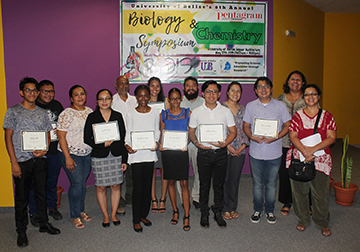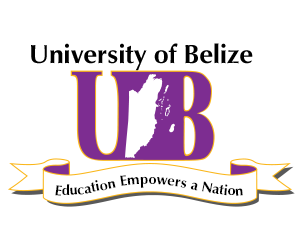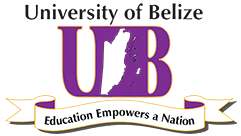- Version
- Download 373
- File Size 2.20 MB
- File Count 1
- Create Date May 31, 2019
- Last Updated May 31, 2019
UB Imprint Vol 52: UB – Shaping a Sustainable Future for Belize through our Students’ Research

Students were recognized for their research. There was also a research poster competition where Clinton Cho, Wilmer Guerra and Sabrina Blanco were awarded first, second and third place respectively.
In May 2017, Peter Thomson, former president of the United Nations General Assembly, wrote a letter to leaders of higher education institutions around the world. In his letter, he noted, “It goes without saying that young people are the most capable of the transformation required, having the most to gain or lose, from the success or failure, of the 2030 Sustainable Development Goals. I therefore make this sincere request to you to make these goals an integral part of research, teaching and study at your institutions.”
With the increased demands placed on our societies, due to, among other factors, urbanization, climate change, economic instability and ongoing depletion of our environment, university leadership is an imperative. Universities have long been at the forefront of deconstructing and creating new paradigms; through education and research, universities offer renewed insight for national practices and policies that can fully meet the needs and issues associated with human development.
In its simplest terms, sustainable development is “development that meets the needs of the present without compromising the ability of future generations to meet their own needs (United Nations).” As Belize’s national university and its only public higher education institution that has educated Belizeans since its independence in 1981, the University of Belize, through our 2017 strategic plan, sought to answer the question – how can UB embed sustainability at the heart of its education and learning so as to create a sustainable future for Belize? In response to this question, we deepened our commitment to and engagement with the Sustainable Development Goals (SDGs). We reoriented our teaching and learning curriculum and our campus and facilities management; and our contribution to social and economic issues through innovation, research, partnerships and public engagements have allowed us to pave a way for more responsive and collaborative public services.
Therefore, given our primary role as Belize’s national knowledge producer and given that our institution’s strong reputation for relevant and world-class education, UB continues to be a powerful medium through which Belize creates a more sustainable future. In practice, UB empowers and equips our students – Belize’s future leaders – with the requisite knowledge, skills, attitudes and values to think and behave in ways that fosters sustainability; that is, for example, global citizenship, recycling, climate change, biodiversity, renewable energy and social responsibility, all of which emphasizes responsibility to self, others and the planet. In this regard, UB is an agent in promoting principles and practices of sustainability within the society.
Furthermore, sustainability is not simply a matter of integrating new content into our education programs; we recognize that it requires the unpacking of social, economic, cultural and environmental assumptions which serve the status quo and which are reproduced by our education systems. As such, it has been widely accepted that sustainability requires forms of research that challenges boundaries at several interfaces; and with this understanding, the University continues to produce research that is inter and multidisciplinary, has tremendous potential impact, focuses on social and structural changes and includes the communities it intends to serve.
UB’s research symposiums are evidence of this.
While sustainability encompasses economic and political practices as well as cultural issues, central to sustainable development is its scientific and technology component because this deals with “the interactions between natural and social systems, and with how those interactions either assist or challenge our ability to meet human development needs while protecting the earth’s life support systems (PNAS, 2016).”
On May 17th, 2019, the University explored this area and held its final research symposium for the 2018-2019 academic year – its Biology and Chemistry Symposium, under the theme, “Promoting Science Education through Research.” This year’s symposium highlighted thirty-five (35) research topics critical to Belize’s development. Topics such as food security, air and water quality, energy, marine and wildlife, amongst others, were all addressed. UB, once again, demonstrated its strength to effectively harness research for sustainability and our students and faculty members continue to demonstrate their ability to manage the boundaries between knowledge and action in ways that simultaneously enhance the salience and credibility of the information they produce.
Ultimately, the University of Belize, through its research symposiums, in particular its science and technology seminar, has been able to illustrate viable pathways to sustainability that serves both the needs of economic and environmental interests of Belize and can provide a space where social, economic and political dialogue can occur to make a sustainable future a reality for all Belizeans. As quoted by President Sankat, in his remarks at the symposium, “protecting nature and providing water, food and energy are no longer an either-or proposition. Nature and human development are both central factors in the same equation and it is only through education and research, we can make informed decisions, enhance the effectiveness of our policies and build lasting change for our future.”





